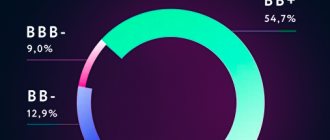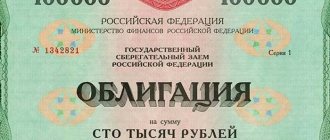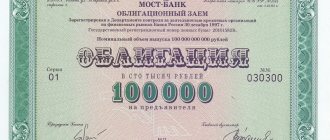During the existence of the USSR, the issue of bonds in the country was aimed at increasing state assets. Currently, it is also associated with the need to increase monetary volumes, but now this procedure is also available to individual organizations. There are a lot of all kinds of bonds on the market: housing, municipal, renewable, etc. For most, the turnover of bonds involves their repayment by the debtor on time. In this regard, you should know whether it is possible to repurchase your own bonds from the creditor before the appointed date.
Procedure and conditions for bond repayment
As you know, a bond is a debt security. Some company (called the “issuer”) issued its bonds to the stock exchange to raise funds. Private investors, banks, funds - in a word, market participants - purchased these bonds and now actually became the company's creditors.
The issue (prospectus) of a bond indicates its main parameters:
- denomination;
- interest paid to holders (coupons);
- frequency of payments;
- maturity.
For example, the Sberbank-001-03R bond has a par value of 1000 rubles, an 8% coupon, which is paid twice a year, and will be redeemed on December 8, 2020. It is on the maturity date that the last coupon will be paid, as well as the face value.
You can view this data both in the bond prospectus and on the website https://www.rusbonds.ru: everything is very convenient and clear there. The service even calculates duration itself, which is necessary to know to implement some strategies.
The bond enters the secondary market both at par price and at a discount (i.e. below par). Moreover, the latter case is implemented most often - in order to stimulate investors to buy more bonds of the issue (lower price - higher final yield).
During trading, the price of a bond may change and be either higher or lower than its face value. For example, if the key rate rises, the yield of the bond also increases, and its price falls. If the rate decreases, the price of the bond rises and the yield falls. Read more here.
But the bond is always repaid at par, regardless of the market price. Therefore, an investor can either make money if he buys a bond below its par value, or lose money if he buys a bond at a higher price.
Consequently, the Sberbank-001-03R bond mentioned above will be redeemed at par - the investor will receive 1,000 rubles in his account for each bond in his possession. Plus the last coupon - namely 13.15 rubles.
The bond repayment occurs automatically on the specified date. The investor himself does not need to do anything - the broker himself will write off the securities from the account (the bond will simply disappear from the brokerage account).
And here’s another interesting article: What are bond coupons and why are they cut?
Transferring money is a little more complicated. In my experience, with OFZs the coupon and face value are paid immediately on the maturity date. For corporate cases there is a delay - up to 3-5 working days, less often - up to 2 weeks. Therefore, if on the redemption day your bond disappears from your account, but the money has not arrived, there is no need to panic ahead of time. Most likely, the issuer simply did not have time to transfer the entire amount to the broker. Or the money is transferred to the broker, but he slows down for some reason.
To make sure that the issuer actually repaid the bond and did not default, you can look at https://www.rusbonds.ru - in the news section they publish whether the company has repaid and in what amount. And if not, what are the reasons for the technical default and should investors panic?
Important: if you have a discount bond, you will only receive the face value of the bond: there is no coupon for such bonds.
Bond offer
All of the above applies to the redemption of “simple” bonds, i.e. which have an issue date and a maturity date. If there is an offer, then the situation is more complicated.
An offer is a public offer from the issuer to buy back (i.e., redeem) a bond at par, without waiting for the expiration of the bond.
For example, repayment could be made in 2035, but that is a long time, and who knows what will happen during these years. But issuers are making two offers - in 2021 and 2025. That is, you can buy a bond now (in 2019) and repay it at par within a year, without waiting until 2035.
There are two types of offers:
- put, or irrevocable - the investor can present the bond for redemption, and the issuer is obliged to satisfy it;
- call, or callable - the issuer himself, at his own request, repays the bonds (the entire issue or only part).
It is clear that an irrevocable offer is more interesting for an investor, when he himself can decide whether he needs to repay the bond or not. In Russia, most offers are of the “put” type (or, as they sometimes say, with a put option).
To participate in the offer you need:
- find out the date of the offer and its type in advance;
- if the offer is a “put” type, then find out the deadline for submitting an application for redemption (usually 1 week before and 1 week after the announced date of the offer);
- submit an application for redemption through a broker (often you will need to pay a small commission for this action);
- wait for the issuer to redeem the bond and transfer the money.
If a coupon is paid on the offer date, it will also be credited to your account. If the day of the offer and the coupon payment do not coincide - ?\_(?)_/?.
And here’s another interesting article: What is a structured bond, how and why should private investors buy it?
When making a call offer, you do not need to declare/send anything anywhere. Here the issuer himself decides how many bonds he buys from the market. On the date of such an offer, the bond may disappear from your account (but money will appear in its place), or it may remain.
One of the main dangers of the offer is an arbitrary change in the coupon size after the announced date. There was a coupon of 13%, now it’s 0.01%: such situations are not uncommon. It is clear that after such a trick with your ears, your bond will become cheaper, and if you did not repay it at par, you will greatly regret it. Read more about the offer and its pitfalls.
How reliable is it?
Bonds are one of the most reliable ways of income for traders.
The centuries-old history of transactions has made it possible to create a wide precedent base, as well as the necessary norms for regulating relations in this area. The current state of affairs completely eliminates the possibility of fraud and ensures the safety of investors and issuers, and also proclaims the unshakable legal validity of all transactions made.
But do not forget that any investment is a risk. In order to successfully trade in the bond industry, you must be confident in your ability to evaluate and analyze the market. In addition, you need to understand the basic principles of trade and economics.
Partial repayment (depreciation)
Some issuers (in particular, municipalities) offer partial repayment of the bond - amortization. This term refers to the gradual repayment of the face value of a debt security.
Let's take, for example, the BashkortostanResp-34008-ob bond. Bond amortization schedule:
So, on September 25, 2015, 20% of the face value had already been repaid, i.e. 200 rubles. Since then, there have already been 5 partial repayments, and now the remaining par value of the bond is 300 rubles (70% of the initial par value has been repaid).
This scheme allows the issuer to gradually reduce the debt burden, avoiding a large payment on one day. For an investor, this is both a plus and a minus.
The advantage is that his funds are gradually released. The downside is that as the denomination decreases, the absolute size of the coupon also decreases. In this example - 19.32 to 5.72 rubles (while the coupon percentage is constant - 7.75%, but 7.75% of 1000 rubles is one thing and another thing from 300).
General concepts
The basic requirements are set out in Art. 17.1 Federal Law. The debt must be repaid early if:
- This possibility is provided for when issuing debt securities.
- The debtor violates the terms of payment of income on obligations.
- Deterioration of the financial security of the loan.
- Failure by the investor to comply with deadlines for the acquisition of valuable documents.
The opportunity to terminate financial relations before the stated deadline for the redemption of bonds is provided to all participants in the process, if the law is complied with.
Redemption of “perpetual” bonds
“Perpetual” bonds are called “perpetual” because there is no specified maturity date. Theoretically, they can be traded on the stock exchange for as long as the issuer exists.
However, in reality, most perpetual bonds have a bond on them - most often a put. Therefore, the investor can repay it at par on the offer date - if he suddenly needs money urgently, but the market does not give a normal price for the bond.
When is it necessary to buy back
The longer the issue period, the higher the risk of a decrease in the interest rate on bonds. To prevent financial losses on income payments, issuers resort to repurchasing their bonds. This means that the organization has the right to purchase bonds before the official redemption date approaches. But the right to such redemption must be agreed upon in advance.
That is, as soon as interest rates begin to fall low, the company exercises its right to repurchase. In return, after a certain period of time, it issues the same securities to the market or issues new ones, but with a lower coupon rate, which automatically reduces the cost of servicing them.
What to do if the issuer does not repay the bond
If the issuer does not produce the bond and does not give any comments on this matter or guarantees payment a little later, then this is called a technical default. If the issuer declares bankruptcy, then, of course, it will no longer pay off its debts. And this is a complete default.
In these cases, nothing much can be done. If a technical or complete default is declared, the price of the bond plummets. You can try to sell it on the secondary market - and then the price it will sell for is the price it will sell for. All that remains is to record the loss and draw conclusions.
Why are bonds still trading after the issuer’s default? You ask. In fact, bond buyers are actually creditors of the company - albeit of the 4th priority. There still remains a ghostly chance that the issuer will repay at least part of the obligations.
And here’s another interesting article: The most profitable bonds in 2021
Here, for example, is a chart of the cost of a defaulted bond of the notorious Home Money IFC. The price has literally fallen to 1.5 rubles (from 1000), and there is now virtually no trading on it - the bonds are stuck with creditors and the most desperate investors.
In the event of default, the bond will not be able to be repaid. Even on offer. Only sell on the stock market.
Thus, the bond is redeemed either on the issue expiration date or on the offer date. Moreover, the offer can be either voluntary (the investor himself decides whether to repay the bond or not) or compulsory (the issuer himself repays the bond issue - in whole or in part). Perpetual bonds are redeemed only on the offer date. Some bonds have amortization - gradual repayment of the face value. In the event of a default, it will no longer be possible to sell the securities at par. That's all. Good luck, and may the money be with you!
Rate this article
[Total votes: 3 Average rating: 5]
Reasons for ransom
The general financial crisis in the world and the country led to a fall in the value of bonds of most issuers. Investors also find themselves in a situation where they need real working capital, which is in short supply. Under these conditions, creditors are trying to get rid of securities in order to receive finance and put them into production.
Under certain conditions, an organization may be required to repurchase its own shares
Naturally, issuers who have sufficient financial savings resort to purchasing their own obligations. There is another reason for early redemption - this is the possibility of introducing new bonds into circulation. But without the need to comply with all the initial formalities, which take a significant amount of time (up to 2 months).
If the basic procedure for the repurchase is established in the decision on the issue, then it is carried out without significant problems.









